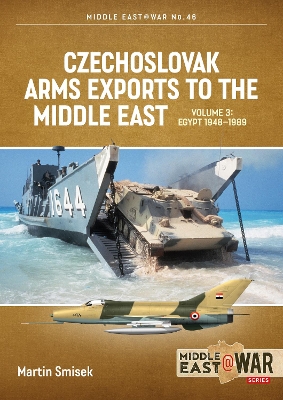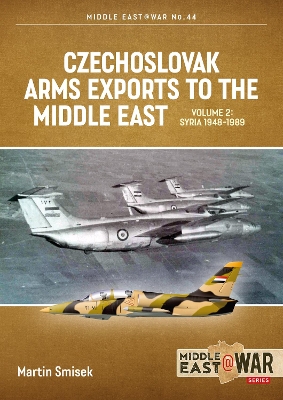Middle East@War
3 total works
Eager to fully use its excess arms manufacturing capacities to earn as much hard currency as possible, communist Czechoslovakia became one of the principal arms suppliers to the Middle East during the Cold War.
After the end of the Second World War, Czechoslovakia became an integral part of the Soviet Bloc which was heralded by the communist coup d'etat in February 1948. Before that date, however, the communist-led government in Prague had already decided, with backing from Moscow, to provide the newly established State of Israel with armament, which subsequently led to the violation of the UN arms embargo. These arms - infantry weapons and fighter aircraft - played a crucial role in the subsequent 1948 Arab Israeli War. As well as armament, the Czechoslovak Army also trained the initial cadre of personnel for the Israeli Air Force and Israeli paratrooper forces. When it became clear that Israel would not become a communist country, solid relations between the two states were disrupted by the Czechoslovak government. From then onwards, the leadership in Prague concentrated on deliveries of military hardware to Israel's Arab opponents.
Jordan obtained Czechoslovak infantry weapons in 1956 and Amman expressed interest in arms supplies and military assistance from Czechoslovakia in subsequent years. This volume also contains information related to minor deliveries of Czechoslovak weapons to other states in the Middle East such as Kuwait, Lebanon, Qatar, Saudi Arabia, Tunisia, the United Arab Emirates, and to various Palestinian factions.
The first volume of this mini-series details the general development of the Czechoslovak arms industry post-1945 as well as detailing the principles, organisation and history of arms export from communist Czechoslovakia whilst also outlining the training of foreign military personnel in Czechoslovakia. Subsequent volumes will discuss other major Arab clients in the Middle East and North Africa. Using declassified original documentation, this is the most comprehensive account of Cold War Czechoslovak military involvement in the Middle East ever published.
After the end of the Second World War, Czechoslovakia became an integral part of the Soviet Bloc which was heralded by the communist coup d'etat in February 1948. Before that date, however, the communist-led government in Prague had already decided, with backing from Moscow, to provide the newly established State of Israel with armament, which subsequently led to the violation of the UN arms embargo. These arms - infantry weapons and fighter aircraft - played a crucial role in the subsequent 1948 Arab Israeli War. As well as armament, the Czechoslovak Army also trained the initial cadre of personnel for the Israeli Air Force and Israeli paratrooper forces. When it became clear that Israel would not become a communist country, solid relations between the two states were disrupted by the Czechoslovak government. From then onwards, the leadership in Prague concentrated on deliveries of military hardware to Israel's Arab opponents.
Jordan obtained Czechoslovak infantry weapons in 1956 and Amman expressed interest in arms supplies and military assistance from Czechoslovakia in subsequent years. This volume also contains information related to minor deliveries of Czechoslovak weapons to other states in the Middle East such as Kuwait, Lebanon, Qatar, Saudi Arabia, Tunisia, the United Arab Emirates, and to various Palestinian factions.
The first volume of this mini-series details the general development of the Czechoslovak arms industry post-1945 as well as detailing the principles, organisation and history of arms export from communist Czechoslovakia whilst also outlining the training of foreign military personnel in Czechoslovakia. Subsequent volumes will discuss other major Arab clients in the Middle East and North Africa. Using declassified original documentation, this is the most comprehensive account of Cold War Czechoslovak military involvement in the Middle East ever published.


